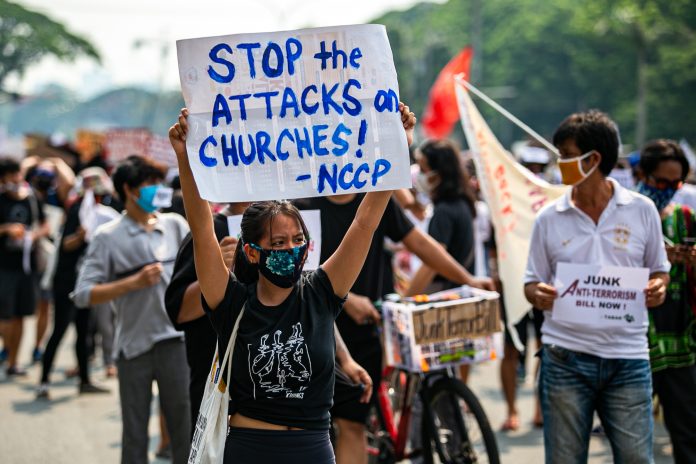Priests and pastors who preach about liberation and human rights can be accused of advocating terroristic acts under the definition of terrorism in the Philippines’ new anti-terrorism law.
Activists warned that the vagueness of the definition can qualify a priest or a religious person who preaches Jesus Christ’s liberating acts as a threat to national security.
In an online forum organized by the Movement Against Tyranny, legal experts said a priest or a pastor who speaks about the “liberating mission” of the Church or “comes to the aid of a person being arrested” can also be tagged as a terrorist.
Lawyer Fhillip Sawali said that under the new law, a priest can be accused as a terrorist if he sides with a person arrested for terrorism or speaks in favor of an organization branded as a terrorist.
“That’s the hard part there,” said the lawyer. “Under the law’s provisions, anyone, even a priest who comes to aid a wrongfully accused person, can be designated as a terrorist.”
Early this month, the country’s Department of Justice released the implementing rules and regulations of the Anti-Terrorism Act, almost three months after the law took effect.
The law allows warrantless arrest and detention of suspects for up to 24 days without charge.
It also empowers the Anti-Terrorism Council to designate suspects or groups as suspected terrorists who could be subjected to arrests and surveillance.
The IRR of the anti-terror law allows the council to designate persons as terrorists and publish names publicly based on “reasonable ground of suspicion.”
Rule 6.3 of the IRR indicates that “for purposes of designation… probable cause shall refer to a reasonable ground of suspicion supported by circumstances warranting a cautious person to believe that the proposed designee meets the requirements for designation.”
The law defines terrorism as the commission acts in order to intimidate the public, spread a message of fear, destabilize society, create an emergency, or undermine public safety.
It also stated that one of the purposes of terrorism is to “provoke or influence by intimidation the government” or “any of its international organizations.”
Lawyer Howard Calleja, the first-ever petitioner, said the “powerful anti-terrorism council has “the sole power and discretion” to decide who goes to jail or not.
“The procedure and the conduct of the anti-terrorism council in designating a person or a group as a terrorist is not clear in the provisions of the law and in the IRR,” said Calleja.
He said the law and the IRR do not include procedures and measures on checks and balances, adding that the council acts as “the judge, the jury, and the executioner” of the new law.
“So, if you are going to appeal and seek delisting, you will approach the same council that alleges you of being a terrorist,” he said.
At least 37 petitions challenging the constitutionality of the law have been filed before the Supreme Court, making it the most contested legislation in the country.
The high court, however, has not acted on the petitions yet.
Benedictine Sister Mary John Mananzan called on the Supreme Court to “immediately act on the petition” for a temporary restraining order, which was filed a few days after the law took effect in July.
“Is it also possible for the Supreme Court to expedite its deliberation on the petitions against this terror law?” said the nun.
Sister Mananzan said the government must change the name of the new law into “state-terrorism law because it aims to terrify us all.”
The nun encouraged church workers to continue to speak to power despite persecution and the threats of the new law.
“Now more than ever,” she said, “the Church needs to infect the people with ‘courage virus.’”









